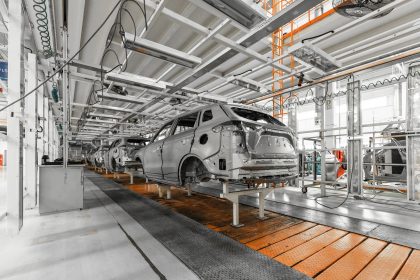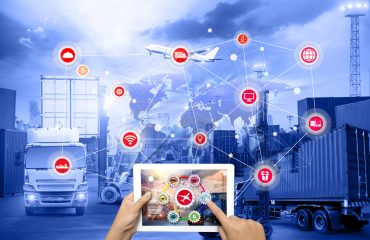
The automotive industry is constantly evolving, and so is the logistics involved in getting cars from the manufacturer to dealerships or customers. The future of inbound automotive logistics is all about technology and innovation. From artificial intelligence (AI) to blockchain technology for secure transactions, the industry is exploring new ways to streamline the supply chain and reduce costs. This blog post examines some automotive logistics trends and breakthroughs shaping the supply chain.
Trends That Are Shaping the Future of Inbound Automotive Logistics
As the demand for electric vehicles grows, logistics companies also need to adapt to the specific requirements of these vehicles. The future of inbound automotive logistics is exciting, and innovation is key to staying ahead in a rapidly changing industry.
Integration of Advanced Technologies
Advancements in technology are revolutionizing every sphere of business—and inbound automotive logistics is no exception. The integration of artificial intelligence (AI), the Internet of Things (IoT), and automation is pivotal in providing real-time visibility into the supply chain.
Automation in warehouses, from robotic forklifts to automated sorting systems, ensures that inbound processes are more efficient, accurate, and safer. Sensors placed on products, pallets, or vehicles transmit continuous data streams, enabling logistics professionals to track and monitor the status of shipments and inventory levels. Meanwhile, by leveraging AI algorithms, logistics companies can forecast demand, predict optimal stock levels, and route deliveries.
Related: The Role of Demand Management in Supply Chain Optimization
Shift Towards Electric Vehicles
The global shift towards electric vehicles (EVs) has begun. In Canada, all passenger vehicles, including cars, SUVs, crossovers, and light trucks must be hydrogen-powered, electric, or hybrid by the year 2035.
That said, electric vehicle (EV) production demands new parts and battery management systems. However, the handling, storage, and transportation of these components require specialized procedures, which inbound logistics must adapt to. The sourcing and transportation of lithium for batteries, for example, present both challenges and opportunities for logistics companies. The procurement of these materials often requires establishing new supplier relationships and routes, while also grappling with safety and environmental regulations.
Industry 4.0 and Automation
Automation is a cornerstone of Industry 4.0 within the automotive industry. Robotics, automatic assembly systems, and simulation testing operations provide faster and more efficient delivery within the plant, warehouse, and along the transportation system.
But beyond assembly lines, automated solutions can significantly optimize warehouse and transportation operations, leading to considerable speed, accuracy, and cost reduction. They can streamline complex logistics scenarios, adapt to changes on the fly, and minimize the potential for human error.
Sustainable Practices
The push for sustainability permeates every aspect of automotive logistics. With governments demanding that auto manufacturers reduce their carbon footprint and focus on safe, sustainable practices, companies must adopt sustainable practices such as eco-friendly packaging materials and fuel-efficient transportation modes.
Advancements in bio-based packaging options and alternative fuels are playing a significant role in reducing the carbon footprint of logistics activities.
Data-Driven Decision Making
Automotive logistics is no stranger to using real-time data analytics to streamline operations. Real-time data analytics enables companies to refine transportation routes, manage inventories proactively, and predict maintenance cycles, leading to smoother and more cost-effective logistics operations.
In addition, machine learning algorithms can predict machinery wear and tear, weather conditions, traffic patterns, and other related challenges, helping to keep equipment and vehicles in optimal condition. Route optimization not only reduces fuel consumption but also ensures timely deliveries.
Collaboration and Ecosystem Integration
Across the automotive industry, more stakeholders are collaborating to open new markets and enhance the development of newer technology. The parties involved are expanding to include leading technology strategists, tech companies, and big-money investors to provide safer and more efficient transportation options.
Integrating data across platforms enhances communication and efficiency. It provides a unified view of the supply chain, enabling stakeholders to respond quickly to shifts in demand or supply chain disruptions.
Key Innovations to Watch
In the realm of automotive logistics, several technologies stand out for their potential to disrupt the traditional ways of operating.
Autonomous Vehicles for Delivery
With drones and self-driving vehicles becoming a common sight in many districts, the use of autonomous delivery vehicles and technology is increasing. This technology is being used for “last-mile delivery” wherein a product is in the final steps of the journey to the consumer. These technologies, however, must contend with evolving regulations and safety standards.
Blockchain for Transparency and Traceability
Blockchain technology has been marked as a reliable source of transparency and traceability within the supply chain system. Using the precision of real-time data, this technology allows for cost-saving measures through sustainable practices. In addition to better data management, it also leads to faster order processing without having a surplus of inventory as every sector of the supply chain has the same real-time information.
3D Printing of Parts
Using 3D printing for on demand production of spare parts has been a game-changer for many manufacturing companies in the automotive field. Using advanced equipment and producing 3D spare parts can help lower costs, reduce stockouts and overstocks, and boost customer satisfaction. With the use of this technology, manufacturers can shorten lead times and the need to readjust machinery for design changes.
Hyperloop Technology for High-Speed Transportation
Though still in conceptual stages, hyperloop technology was first introduced in 2013 as a mega high-speed transportation method. Hyperloop technology could revolutionize high-speed transportation of goods, significantly reducing transit times and potentially altering global supply chain dynamics.
Learn More About Lean Supply Solutions’ Expertise in Innovative Logistics Solutions
Inbound automotive logistics is poised for a transformation, propelled by technological innovation and the necessity for greater sustainability. At Lean Supply Solutions, integrated customized logistics solutions are a priority. As a leading provider of global supply chain management, we offer lean processes, leading-edge IT systems, and world-class systems to all of our clientele.
Contact us to learn how our innovative logistic solutions can better manage your business with cost-saving measures.


